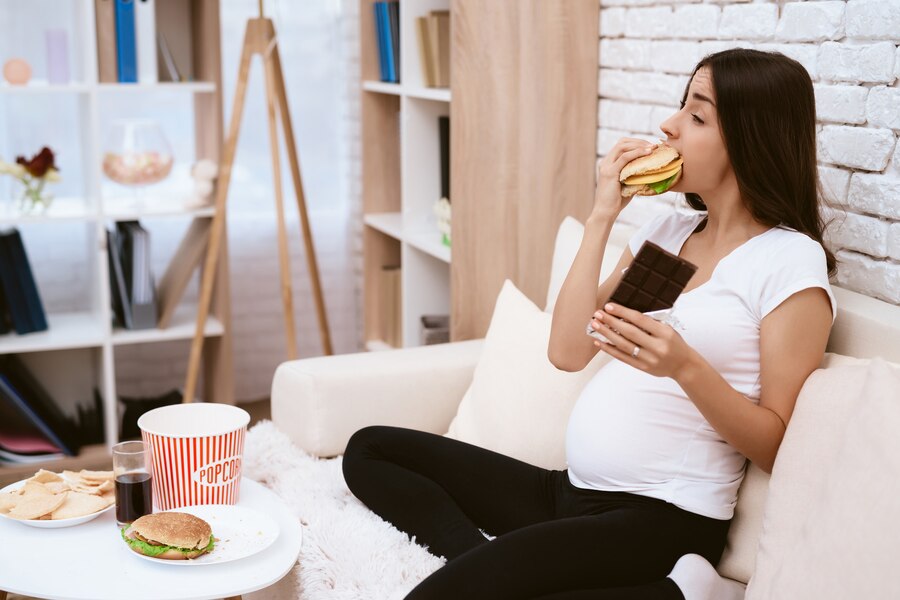Despite being a complex journey, pregnancy can be an incredibly beautiful experience. But to ensure the safety of both mother and child, women must be cognizant of any factors which could jeopardize their pregnancies. Unfortunately, certain foods can increase the risk of miscarriage in pregnant women. These foods should be avoided or eaten only in moderation to ensure the health and safety of both mother and baby.
This article will look at common foods that could cause miscarriages if consumed during pregnancy. It will also discuss why these particular items are dangerous and how they might affect a developing baby. Read on to learn more about foods that could lead to abortion.

What are the usual causes of a miscarriage?
The heartbreaking tragedy of early pregnancy termination is known as a miscarriage, typically occurring before 20 weeks. A genetic abnormality in the fetus is one of the most common causes of miscarriage, which can occur in about 50-75 percent of abortions. But other factors can increase the risk for a pregnant woman. These include:
Advanced maternal age
Women over 35 are at a higher risk of miscarriage. Some studies suggest that women over 40 have a higher risk of miscarriage than younger women. To mitigate the risk of abortion, many medical professionals may suggest prenatal tests such as amniocentesis and chorionic villus sampling (CVS) to identify genetic abnormalities. By doing so, expectant mothers can make informed decisions with regard to their pregnancy while being aware of any risks posed by potential genetic issues.
Hormonal issues
Hormonal imbalances or irregularities can increase the risk of miscarriage. When the hormone progesterone is low, it can affect the development of the fetus. A woman’s thyroid hormones and other hormones must also be balanced to ensure a healthy and successful pregnancy.
Infections
Certain infections, such as rubella and bacterial vaginosis, may also increase the risk of miscarriage. The presence of other sexually transmitted diseases can also increase the risk. The transmission of certain infections to the fetus can result in a tragic abortion.
Certain food products
And finally, certain food products can increase the risk of miscarriage. Depending on the food, it can affect the fetus’ development or cause an infection. So it is essential to care for a baby’s health and safety even before birth by avoiding foods that could potentially lead to a miscarriage.
17 Foods Increases The Risk Of Miscarriage
Pregnant women should be aware of the foods that can increase their risk of miscarriage in early pregnancy. Different food items can affect the fetus differently and increase the risk of abortion.
1. Raw or undercooked meat
Undercooked or raw meat can contain harmful bacteria, parasites, and viruses that could lead to an infection. This can be particularly dangerous for pregnant women, as it can increase their risk of miscarriage or developing other health issues.
2. Unpasteurized dairy products
Like raw meat, unpasteurized milk and dairy products can also contain bacteria that can harm pregnant women. Some soft cheeses, such as feta or brie, can also contain bacteria that increase the risk of an unborn baby.
3. Raw eggs
Raw or undercooked eggs are another type of food that can contain salmonella bacteria. Salmonella can cause food poisoning, which is especially dangerous for pregnant women and their baby’s health.
4. Certain fish
Some types of fish, including swordfish, king mackerel, shark, etc., can contain high levels of mercury. Excessive consumption of these fish can lead to an accumulation of mercury in the body, which is highly toxic and dangerous. Consuming large amounts of mercury during pregnancy could increase the risk of developmental issues in the baby’s developing brain.
5. Animal liver
One of the most common sources of vitamin A is animal liver. Consuming excessive amounts of this nutrient can cause it to accumulate in your body, leading to potentially dangerous levels of toxicity. Although vitamin A is essential for normal development in the fetus, too much of it can result in congenital disabilities and miscarriage.
6. Sesame seeds
Pregnant women should avoid white and black sesame seeds containing high amounts of aflatoxins. These poisons are produced by certain types of fungi and can lead to an increased risk of abortion. Reducing the consumption of sesame seeds is recommended.
7. Alcohol
It’s best to avoid alcohol during pregnancy. Because alcohol can cross the placenta, it can lead to fetal alcohol syndrome or other health issues for the baby. An abundance of research has connected alcohol consumption during pregnancy to a heightened possibility of miscarriage and other birth defects.
8. Caffeine
Caffeine is a stimulant; consuming large quantities of it can increase the risk of miscarriage or birthing an underweight baby. Limiting caffeine consumption during pregnancy to no more than 200 milligrams per day is best.
9. Pineapple
Pineapple contains bromelain, an enzyme that can potentially induce labor. Consuming large amounts of pineapple and pineapple juice during the first trimester could cause uterine contractions, which could lead to a miscarriage.
10. Papaya
Another food that can induce labor is papaya. Unripe papaya contains carpaine and oxytocin compounds, which can cause uterine contractions.
11. Raw or unwashed vegetables
When consuming salads or vegetables, it is essential to ensure they are washed thoroughly. Unwashed vegetables can contain harmful bacteria that could cause food poisoning. The effects of food poisoning can be particularly severe in pregnant women.
12. Aloe vera
While some women have used aloe vera to treat morning sickness during pregnancy, it is not recommended. Aloe vera can contain compounds that can act as an abortifacient, meaning it can cause a miscarriage.
13. Sprouted potatoes
Although potatoes are a healthy food, consuming sprouts during pregnancy could lead to the buildup of toxins in the body. Everyone should avoid eating sprouts, but pregnant women should be especially careful, as they could increase harming their babies.
14. Processed or deli meat
Processed and deli meat should also be avoided during pregnancy. These meats can contain listeria, a type of bacteria that can cause an infection. Listeria can cause serious health issues during pregnancy, so it’s best to avoid processed or deli meats to keep your baby safe.
15. Wild apples
Wild apples can contain a hormone called prostaglandin, which can lead to contractions and induce labor. Eating wild apples during pregnancy is not recommended and can put your baby’s health at risk.
16. Crab meat
While a delicious delicacy, crab meat contains high levels of cholesterol and iodine. Eating large amounts of crab meat can increase the risk of internal bleeding and miscarriage.
17. Licorice
Licorice contains glycyrrhizin, which can affect the production of progesterone. Low levels of this hormone can lead to an increased risk of an unborn child.
When can a miscarriage happen?
A miscarriage can happen at any time during pregnancy, but it is most likely to occur in the first trimester. The risk of miscarriage decreases with each week, so it’s essential to be vigilant and take care of yourself during the first few months of pregnancy.
The best way to avoid abortion is to make sure you are taking care of yourself and your baby. Eating a balanced diet, avoiding risky foods, and getting regular prenatal care are essential steps to a healthy pregnancy. If you have any inquiries or worries, it is essential to consult your healthcare provider.
What are the symptoms of a miscarriage?
If you think you may be having a miscarriage, it is important to seek medical attention as soon as possible. Some of the common symptoms of a miscarriage include:
- Heavy vaginal bleeding
- Lower abdominal pain or cramping
- Passing clots or tissue from the vagina
- Back pain
- White-pink mucus discharge
- Unexpected diminished pregnancy sensations (including queasiness or tender breasts)
If you detect any of these signs, talk to your doctor promptly.
Final Thoughts
These foods that can cause miscarriage should be avoided or eaten only in moderation during pregnancy. As a pregnant woman, it is essential to be aware of foods that could risk your and your baby’s health. By avoiding these foods and getting regular prenatal care, you can ensure a healthy pregnancy for both you and your baby.
It is also important to remember that not all pregnancies end in miscarriage, and many women go on to have healthy, full-term pregnancies. A pregnant woman’s overall health and lifestyle habits will always play a role in preventing miscarriages. Depending on your individual situation, your healthcare provider may be able to recommend specific lifestyle changes or medications to help reduce the risk of a miscarriage.


